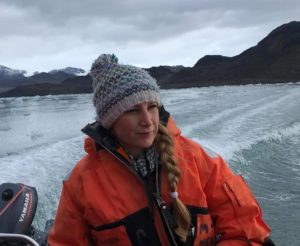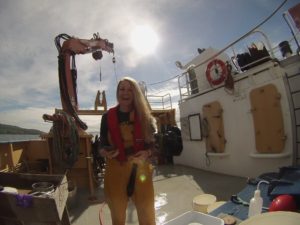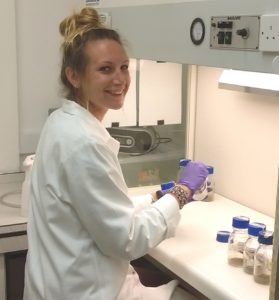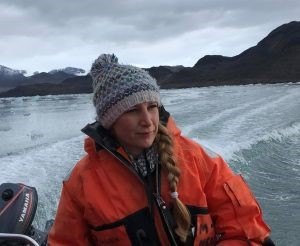Our world-leading marine research underpins a wide range of undergraduate and postgraduate programmes: Research-led teaching | Exeter Marine | University of Exeter. In this #MScGraduateInFocus series we are looking back on some of our MSc graduates who have excelled in marine conservation around the world since studying with us.
Today we meet Sarah Nelms, MSc Conservation and Biodiversity graduate (2014) and now a Post Doctoral Research Associate with the University of Exeter!

Hi Sarah! First off, why don’t you tell us what you are up to now and how you got there?
After completing my MSc I immediately began a graduate role with my master’s thesis supervisor which then led to me getting a PhD scholarship at Plymouth Marine Lab and University of Exeter. Upon completing my PhD earlier this year, I was offered a postdoc position back the UoE Penryn campus.
It’s lovely to have you back with us! What do you enjoy most about studying and working with us at the University of Exeter Cornwall Campus?
I loved everything about studying in Cornwall! The campus is beautiful and Falmouth and the surrounding areas are friendly and relaxed. The beaches and countryside are fantastic for an outdoorsy person like myself. The department is very welcoming and I felt like a member of a community that celebrates the achievements of staff and students alike.
The small and friendly campus is what makes UoE Penryn so special. It’s easy to meet people and connect and there are plenty of spots around campus to inspire you.

How did the MSc help you in your career, and do you have any advice for students looking to pursue a similar career?
One of the most important things I gained during the MSc was confidence. The support I received was hugely influential in helping me realise my potential as a scientist and I thrived in that environment. The network of friends and peers I was able to build has also benefitted me since finishing my course.
Additionally, the practical skills I learnt during the MSc, such as science communication, statistical analysis, time-management, were essential during my PhD.
I’d advise anyone looking to follow a career in academia to gain as much practical experience as possible and try lots of things so you can make an informed decision about what direction you want to head in.
Finally, Do you have any advice for anyone thinking of applying to any of our programmes at the University of Exeter?
Work really hard but take quality time off, meet lots of people, be organized and enjoy it!
You won’t regret it!
Thanks Sarah!

If you want to find out more about any of our suite of #ExeterMarine Masters and Undergraduate courses use the links below!
- NEW: MSc in Marine Vertebrate Ecology and Conservation
- MSc in Conservation and Biodiversity
- MSc in Conservation Science and Policy
- MSc in Evolutionary and Behavioural Ecology
- MSc in Sustainable Development
- MSc in Environment and Human Health
- MSc in Renewable Energy Engineering
- BSc Marine Biology
- BSc Zoology
- BSc Environmental Science
- BSc Conservation Biology and Ecology
- BSc Evolutionary Biology
- BSc Animal Behaviour
- BEng Renewable Energy Engineering

